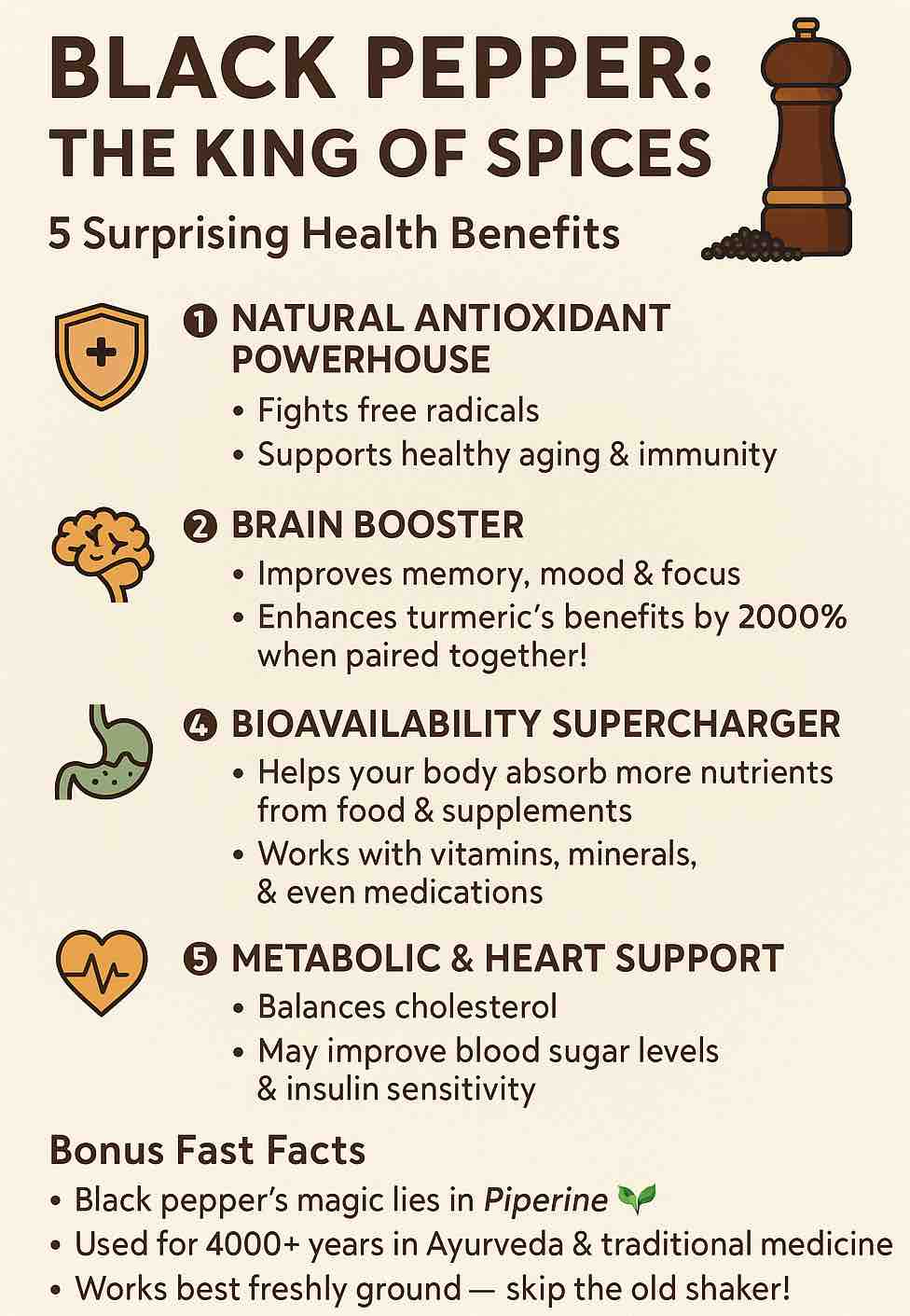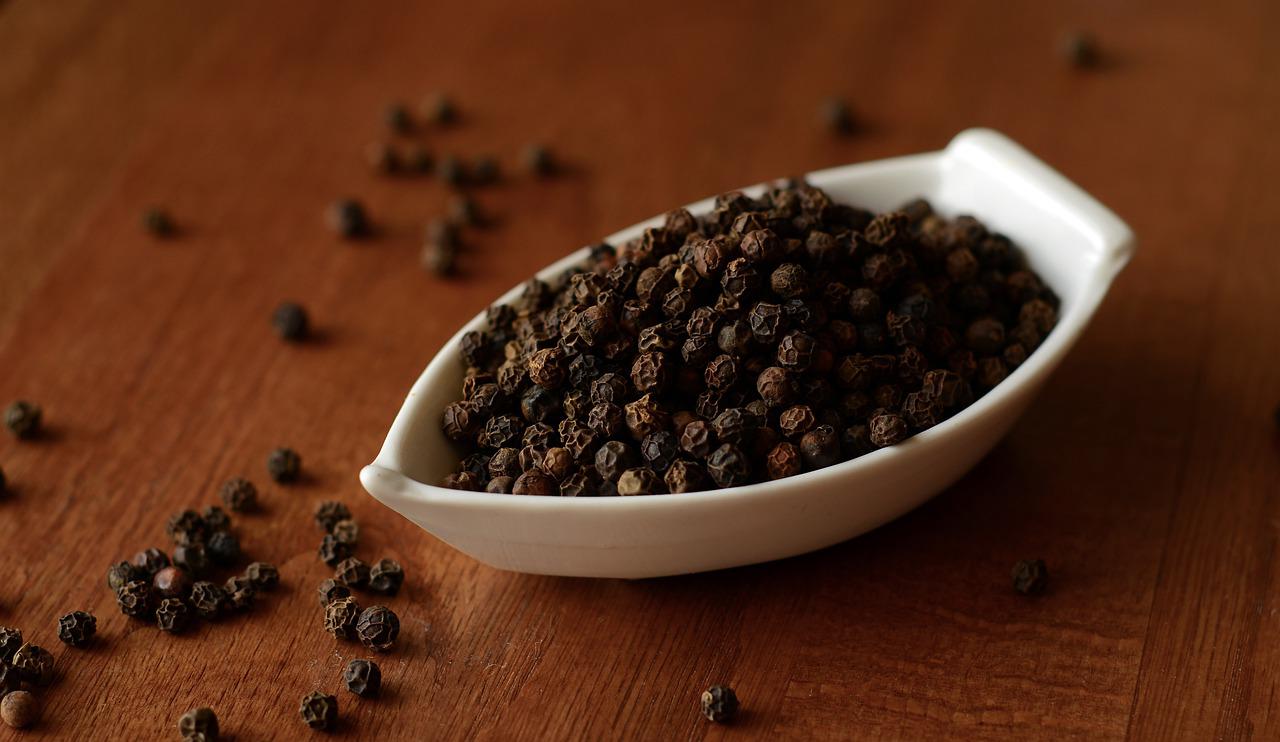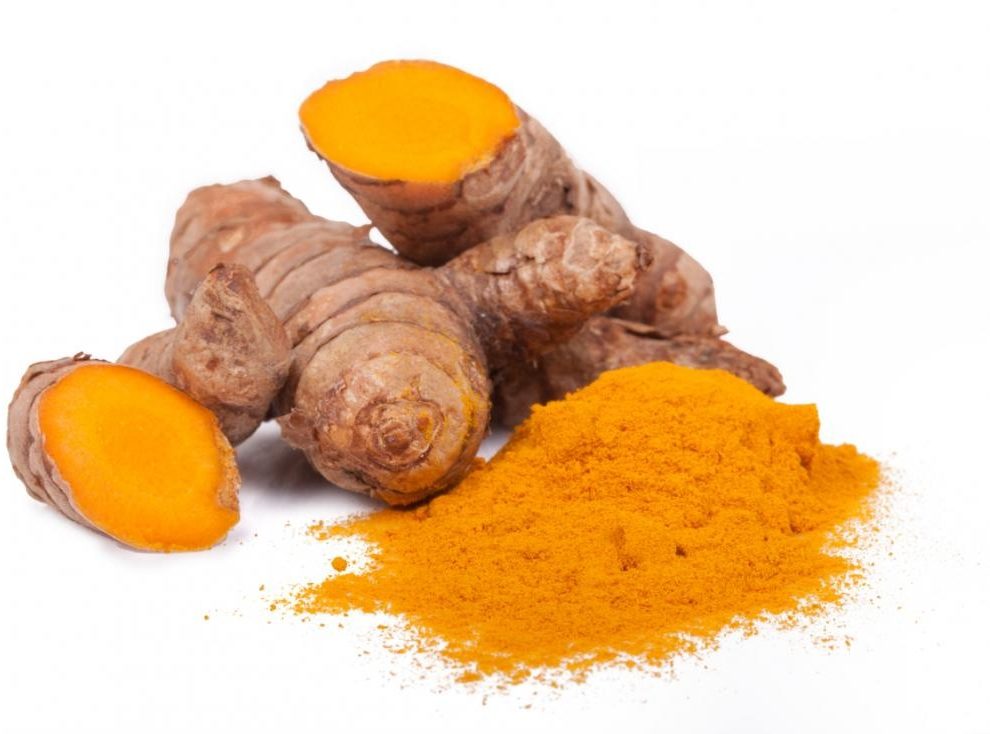
When you think of spices, few can rival the humble black pepper. Sitting proudly on kitchen tables across the globe, black pepper is so common that we often forget it’s much more than just a seasoning. Known as the “King of Spices,” black pepper (Piper nigrum) has been treasured for thousands of years not only for its bold flavor but also for its remarkable health benefits.
In this article, we’ll dive deep into the science-backed benefits of black pepper and explore how you can easily incorporate this powerhouse spice into your daily routine.
A Brief History: The King of Spices
Before we get into the health benefits, let’s set the stage. Black pepper has a rich and storied history:
- Ancient Trade: Originating from the Malabar Coast of India, black pepper was once so valuable that it was called “black gold.” It drove trade routes between Europe and Asia for centuries.
- Ayurveda & Traditional Medicine: In Indian Ayurveda and traditional Chinese medicine, black pepper has long been used to treat digestive issues, respiratory problems, and even as an energizing tonic.
- Modern Popularity: Today, black pepper remains a staple in nearly every cuisine worldwide.
What makes black pepper so potent? The answer lies in a bioactive compound called piperine, responsible for its pungent taste and most of its health benefits.
The 5 Major Health Benefits of Black Pepper
1️⃣ Powerful Antioxidant and Anti-Inflammatory Properties
Modern lifestyles expose us to oxidative stress from pollution, processed foods, and chronic stress. Over time, oxidative damage can contribute to aging, inflammation, and numerous chronic diseases.
- Piperine acts as a potent antioxidant, neutralizing free radicals and protecting our cells from damage.
- Studies show that piperine helps reduce markers of inflammation, potentially benefiting conditions such as arthritis, metabolic syndrome, and even certain cancers.
- A 2024 review highlighted that piperine, along with black pepper essential oils, can modulate inflammatory cytokines and support overall immune function.
💡 Takeaway: Adding black pepper to your meals regularly may provide your body with additional protection against oxidative stress and chronic inflammation.
2️⃣ Supports Brain Health and Cognitive Function
Emerging research suggests black pepper may offer neuroprotective effects:
- Piperine has been shown to enhance cognitive function, improve memory, and potentially slow down age-related cognitive decline.
- Animal studies indicate that piperine may increase levels of neurotransmitters like serotonin and dopamine, which regulate mood, memory, and focus.
- A particularly exciting benefit: when combined with turmeric, piperine enhances the absorption of curcumin (turmeric’s active compound) by up to 2000% — a synergy that many brain-health supplements now leverage.
💡 Takeaway: Regular consumption may support memory, focus, and even help reduce the risk of neurodegenerative diseases when used alongside other brain-healthy foods.
3️⃣ Aids Digestion and Supports Gut Health
In many traditional medicine systems, black pepper is valued for its digestive properties — and modern science agrees:
- Black pepper stimulates the release of hydrochloric acid in the stomach, which aids in digestion, improves nutrient absorption, and prevents gas and bloating.
- It promotes bile acid secretion, helping break down fats more effectively.
- Piperine has mild antimicrobial properties, which may help balance gut flora and combat harmful pathogens like H. pylori.
💡 Takeaway: A pinch of black pepper before meals may assist digestion and promote a healthy gut microbiome.
4️⃣ Enhances Nutrient Absorption (Natural Bioenhancer)
Perhaps one of black pepper’s most unique features is its ability to boost the bioavailability of other nutrients and drugs:
- Piperine slows down the breakdown of compounds in the liver and intestines, allowing for greater absorption into the bloodstream.
- This property has led to piperine being combined with nutrients like curcumin, beta-carotene, selenium, CoQ10, and certain B vitamins to maximize their benefits.
- In India, piperine has even been included in formulations to enhance the absorption of anti-tuberculosis medications.
💡 Takeaway: Adding black pepper to nutrient-rich meals can amplify your body’s ability to absorb vital nutrients.
5️⃣ Supports Heart Health and Blood Sugar Control
Emerging evidence points to black pepper’s potential role in metabolic and cardiovascular health:
- Animal studies suggest piperine may help lower LDL cholesterol, increase HDL cholesterol, and reduce triglycerides.
- It may also improve insulin sensitivity and help regulate blood sugar levels.
- By reducing oxidative stress and inflammation, black pepper may contribute to overall cardiovascular protection.
💡 Takeaway: While more human studies are needed, black pepper may offer supplementary support for heart health and metabolic function.
Other Potential Benefits Under Investigation
- Anti-cancer properties: Early lab studies suggest piperine may slow the growth of some cancer cells, though human research is still in early stages.
- Weight management: Piperine may help inhibit the formation of new fat cells (adipogenesis).
- Antimicrobial effects: May help combat certain bacteria and fungi.
- Respiratory support: Used traditionally for coughs, colds, and sinus relief.
How to Use Black Pepper for Maximum Benefit
✅ Use Freshly Ground Pepper
- Pre-ground black pepper loses its potency quickly as volatile oils evaporate.
- Invest in a good pepper mill and grind whole peppercorns directly onto your food for maximum flavor and benefits.
✅ Pair with Turmeric
- The piperine-curcumin synergy is well-documented.
- Try adding both spices to dishes like curries, soups, and golden milk.
✅ Incorporate into a Variety of Meals
- Sprinkle on salads, eggs, avocado toast, pasta, grilled vegetables, or even fruit for a surprising flavor twist.
- Add to marinades, rubs, or salad dressings.
✅ Supplements (With Caution)
- Piperine supplements exist but should be used cautiously:
- Typical supplemental doses range from 5–20 mg/day.
- May interact with medications due to its effect on drug metabolism enzymes.
- Pregnant or breastfeeding women should avoid high doses.
- Always consult a healthcare provider before starting supplements.
Safety and Precautions
While black pepper is generally safe in culinary amounts, excessive consumption or concentrated supplements may cause:
- Gastrointestinal upset
- Drug interactions (due to enzyme inhibition)
- Irritation for those with GERD, ulcers, or certain gut sensitivities
As with any health intervention, moderation and professional guidance are key.
Final Thoughts
Black pepper is a prime example of how nature packs powerful health benefits into even the smallest of packages. Its versatility, affordability, and science-backed effects make it a worthy addition to nearly every diet.
By simply adding a few fresh grinds of black pepper to your meals, you not only elevate the flavor but also invite a host of protective, nourishing benefits for your brain, heart, gut, and beyond.
Remember: it’s not about mega-dosing, but about consistent, thoughtful use as part of a balanced, nutrient-rich lifestyle.
Quick Summary Table
| Benefit | Key Effect |
|---|---|
| Antioxidant | Fights free radicals, reduces inflammation |
| Brain Health | Supports cognition, boosts neurotransmitters |
| Digestion | Improves enzyme secretion, reduces bloating |
| Nutrient Absorption | Enhances bioavailability of nutrients |
| Heart & Metabolic | Supports cholesterol, blood sugar balance |
📌 10 FAQs About Black Pepper
1️⃣ Is black pepper good for you?
Yes! Black pepper is rich in piperine, a compound with antioxidant, anti-inflammatory, digestive, cognitive, and metabolic health benefits. When used moderately as part of a balanced diet, it can support overall well-being.
2️⃣ How much black pepper should I consume daily?
For most people, 1/4 to 1 teaspoon (1–3 grams) of freshly ground black pepper daily is safe and beneficial. Higher amounts or supplements should only be taken under professional supervision, as piperine may affect medication metabolism.
3️⃣ Does black pepper help with weight loss?
While not a weight-loss miracle, piperine may help suppress the formation of new fat cells and improve metabolism modestly. Combined with a healthy diet and exercise, it may offer some supportive effects.
4️⃣ Can black pepper improve digestion?
Yes. Black pepper stimulates digestive enzymes and stomach acid, helping break down food efficiently, reduce bloating, and improve nutrient absorption. Many traditional systems like Ayurveda have used it for digestive support for centuries.
5️⃣ Is it safe to take black pepper with medications?
Piperine can affect drug metabolism by inhibiting certain liver enzymes (CYP3A4, CYP2D6). This may alter the effectiveness or toxicity of medications. Always consult your doctor if you’re on prescription meds and planning to take large amounts of black pepper or piperine supplements.
6️⃣ Does black pepper help absorb turmeric better?
Absolutely. Piperine increases curcumin (the active compound in turmeric) absorption by up to 2000%. Many turmeric supplements now include black pepper extract for this reason.
7️⃣ Can black pepper prevent cancer?
Preliminary lab studies suggest piperine may have anticancer properties, but current evidence is limited to animal and cell studies. More human research is needed before any firm conclusions can be made.
8️⃣ Is black pepper safe during pregnancy?
Culinary amounts are generally safe. However, pregnant or breastfeeding women should avoid high doses or supplements due to potential hormonal effects and limited safety data.
9️⃣ Can black pepper cause side effects?
Excessive intake may cause digestive discomfort, heartburn, or gastrointestinal irritation, especially in people with GERD, ulcers, or sensitive stomachs. Stick to moderate, food-based amounts unless advised otherwise.
🔟 What’s the best way to consume black pepper?
Use freshly ground black pepper directly on food to preserve its volatile oils and maximize benefits. Pairing it with nutrient-dense meals, turmeric, or healthy fats can further enhance absorption of beneficial compounds.













